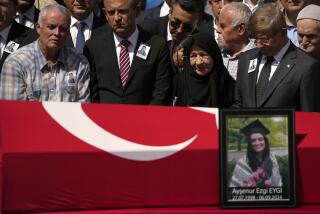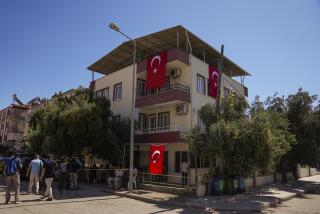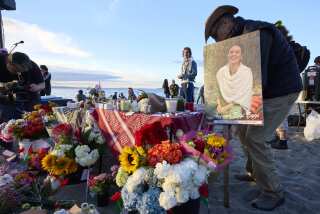Israeli Bulldozer Crushes U.S. Activist to Death
While fellow protesters screamed in horror, a 23-year-old college student and activist from Washington state was crushed to death by an Israeli army bulldozer Sunday as her group was trying to block the demolition of Palestinian homes in a refugee camp in the Gaza Strip, eyewitnesses said.
The Israeli army called her death a “regrettable accident” but blamed the protesters for deliberately placing themselves in harm’s way -- part of what it said has been a pattern of reckless behavior by foreign activists in the West Bank and Gaza.
For the record:
12:00 a.m. March 26, 2003 For The Record
Los Angeles Times Wednesday March 26, 2003 Home Edition Main News Part A Page 2 National Desk 1 inches; 58 words Type of Material: Correction
Death in Gaza -- The A1 photo caption accompanying a March 17 article on the death of an American woman crushed by an Israeli army bulldozer in the Gaza Strip incorrectly implied that the photo was taken moments before she was killed by the bulldozer in the photograph. In fact, Rachel Corrie was killed later by another bulldozer.
The young woman, Rachel Corrie, was one of a group of mainly Americans and Europeans who have staged weeks of demonstrations in the Rafah refugee camp in southern Gaza, where the army has destroyed dozens of structures in a volatile border zone that is rocked by near-constant fighting between Israeli troops and Palestinian gunmen.
Standing in the path of an approaching military bulldozer, Corrie lost her footing as it drew close and was first hit by a massive load of sand and debris being pushed ahead by its blade, then struck by the blade itself, witnesses said.
“I saw her in front of the bulldozer, and suddenly she disappeared from view,” said Palestinian physician Samir Masri, whose family had been playing host to a group of protesters that included Corrie. “I ran out to her and saw her bleeding face, her crushed skull.... I tried to treat her, but everything was broken.”
Corrie was dead of massive head and chest injuries by the time she arrived at nearby Najar hospital in Rafah, said the hospital’s director, Dr. Ali Moussa.
Separately, at least six Palestinians, including a 2-year-old girl, died early today when Israeli tanks and armor pushed into the Nusseirat refugee camp in Gaza, Palestinian doctors said. Two other Palestinians were killed elsewhere in Gaza on Sunday.
Corrie grew up in Olympia, Wash., where she attended school and was frequently seen at peace demonstrations. A college spokesperson said she would have been a senior at Evergreen State College, a small public liberal arts school known for activism in social causes, and had been expected to resume her studies when she returned from the Middle East.
She had told friends and professors she was traveling to the region to be a “peace witness.”
“She was very strong willed in her quiet way, but she wasn’t at all self-aggrandizing,” said Lin Nelson, a professor at Evergreen. “It meant a lot to her to be part of an effort to observe and witness and influence the world.”
Nelson said that Corrie, who took an interest in domestic causes such as the plight of local timber towns that had fallen on harsh economic times, “seemed to have done her homework” about the situation in the Palestinian territories.
“When I heard what happened, I was appalled and sickened,” she said. “I have such a sense of loss.”
The Israeli army expressed regret at Corrie’s death, but a military spokesman also denounced the protesters, saying that over a period of many months, some activists have consistently taken actions that endangered themselves along with Israeli troops and Palestinian civilians.
The group to which Corrie belonged, the International Solidarity Movement, has held protests at the scene of many trouble spots over the course of nearly 2 1/2 years of fighting, with its members frequently placing themselves between Palestinians and Israeli soldiers or Jewish settlers. Sunday marked the first time a member of the group has been killed.
“We are very, very sorry it ended this way,” said Capt. Jacob Dallal, an army spokesman. “But we really have to say this is an extremely dangerous and irresponsible form of protest -- it’s unsafe for everyone. We’re dealing with a combat zone. This is a place where troops are in heavy armor. There’s shooting there all the time. This is not a place where a protest can be held in any kind of a safe way.”
Dallal said bulletproof windows are relatively small and visibility is limited in the type of armored bulldozer that killed Corrie: a super-size model known as the D-9 often used to demolish homes. He said that the Israeli troops, who were clearing ground in search of explosives, had tried to move away from the protesters but that the group followed them.
Witnesses from Corrie’s group, who included four Americans and four Europeans, said she was wearing a fluorescent-orange jacket and would have been clearly visible to the bulldozer’s driver.
“She was standing directly in his path -- she just didn’t back down,” said Nick Burrie, of Dundee, Scotland. “Then she lost her footing, and he just kept right on driving forward.”
Israeli troops temporarily halted the bulldozing after Corrie was hit but continued other operations in the area later Sunday, a military source said.
Officials at the U.S. Embassy, whose staff in Israel has been sharply reduced in advance of expected war in Iraq, could not be reached for comment.
In recent weeks, Corrie had posted accounts of the group’s activities on the Internet. The postings painted a picture of an idealistic young woman who believed she was helping to ease the Palestinians’ plight.
“Rafah continues to witness the destruction of homes ... on a daily basis,” she wrote late last month. Acknowledging that the protests were dangerous, she cited a “variable factor” in trying to block home demolitions -- “whether the driver of a particular tank cares about injuring [protesters] in the process of destroying the welfare of Palestinians living here.”
Evergreen professor and family friend Peter Bohmer said that Corrie’s parents were instrumental in creating an alternative education program in the Olympia public schools and that the desirability of becoming involved in the world was stressed to her from an early age.
“She grew up with the idea that it wasn’t enough to talk about something -- you also had to do something,” Bohmer said.
Built within a forest alongside Puget Sound, Evergreen was a product of 1960s activism and dispenses with such traditional educational concepts as grades, majors and academic departments. The 4,000-student college’s reputation has prompted some conservative legislators to lobby for its closing. Former student Lynda Barry, the cartoonist and author, has described the school as a “hippie college,” while the fame of fellow alum Matt Groening, the creator of “The Simpsons,” has also contributed to the school’s freewheeling reputation.
Corrie, a student of international politics and art, was considered rare among the student body in that she had grown up in Olympia and bridged the divide between lifelong residents and a transient student population.
In a Feb. 14 e-mail to friends, Corrie described one episode in the Palestinian territories in which other activists -- or “internationalists,” as she called them -- tried to halt a bulldozing.
“The internationalists stood in the path of the bulldozer and were physically pushed with the shovel backwards, taking shelter in a house,” she wrote. “The bulldozer then proceeded on its course, demolishing one side of the house with the Internationals inside. The driver then dropped a sound grenade out of the cab of the bulldozer, and continued to demolish the house, at which point the activists were able to escape, amid gunfire from the tank.”
Israel has for many months had a tense relationship with the International Solidarity Movement, whose mainly Western activists have mounted a campaign of protest against a variety of Israeli military activities.
Three of its members were arrested late last year while trying to obstruct the building of a security fence between Israel and the West Bank. Israel says the fence is needed to keep out suicide bombers and other attackers; the protesters charged that Israel was appropriating Palestinian land for it.
Other activists from the group slipped past Israeli soldiers last spring to enter the Church of the Nativity in the West Bank city of Bethlehem during a monthlong standoff between Israeli troops and Palestinian gunmen holed up inside.
Israel tried for a time to deny entry to the activists but drew angry protests when it turned away travelers arriving at Ben Gurion International Airport who turned out to be employed by humanitarian organizations, or who were ordinary tourists or pilgrims.
Rafah, on the Egyptian frontier at the southern tip of Gaza, has been the scene of some of the most intense fighting of recent months between Israelis and Palestinians. The border zone is rife with tunnels that Israel says are used to smuggle weapons and explosives from Egypt into Gaza. It says demolition of structures is aimed at destroying the tunnels, securing the border and clearing areas where Palestinian militants take cover.
Palestinians and human rights groups say Rafah is a prime example of excessive Israeli force being used in a crowded civilian area whose impoverished residents have no way to escape the fighting. At least six children have been among the civilians killed in the area in recent months.
Masri, the Palestinian doctor with whose family Corrie had lived, remembered a spirited, athletic young woman who often observed local mores by wearing a head scarf over her blond hair.
“She was very brave and beautiful, a special friend to me and my family,” Masri said. “She only wanted to help us, and she paid with her life.”
*
Times staff writer Monte Morin in Los Angeles contributed to this report.
More to Read
Sign up for Essential California
The most important California stories and recommendations in your inbox every morning.
You may occasionally receive promotional content from the Los Angeles Times.










